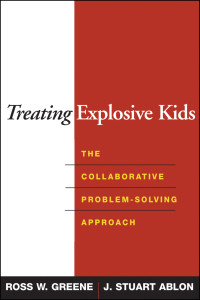How do you handle explosive kids?
In their 2006 book, Treating Explosive Kids: The Collaborative Problem-Solving (CPS) Approach, Dr. Ross Greene and Dr. Stuart Ablon describe a revolutionary, evidence-based approach to intervention with children who display social, emotional, and behavioural challenges. Guided by the mantra “Kids do well if they can,” challenging behaviour is viewed within the model as a way children express that the demands of a given situation exceed their current capacities. Parents and educators are taught to identify: (1) cognitive, emotional, social, communication, and learning challenges, and (2) specific strategies to engage in discussions with the child in order to collaboratively identify how these challenges may be hindering their success, with the ultimate goal of developing a solution together to the problem at hand. Praised by parents, educators, researchers, and clinicians, highlights of the book include case examples and Q&A sections addressing challenges that may arise in implementation and practical solutions, as well as special chapters on intervention in school and therapeutic/restrictive settings.
A feature within the book is an assessment tool -the “Assessment of Lagging and Unsolved Problems” which can be used to identify the specific cognitive, emotional, social, communication, and learning challenges faced by the child, within the CPS approach.
Dr. Ross Greene is a child psychologist, author of books on the CPS approach, including The Explosive Child, Lost at School, and Lost and Found, and the founder of Lives in the Balance , a non-profit organization dedicated to disseminating the CPS approach. Co-author Dr. Stuart Ablon is the current director of Think:Kids, a program in the Department of Psychiatry at the Massachusetts General Hospital that endeavours to develop and instruct on the CPS model.
Greene, R. W., & Ablon, J. S. (2006). Treating Explosive Kids: The Collaborative Problem-Solving Approach. New York, NY: Guilford Press.

